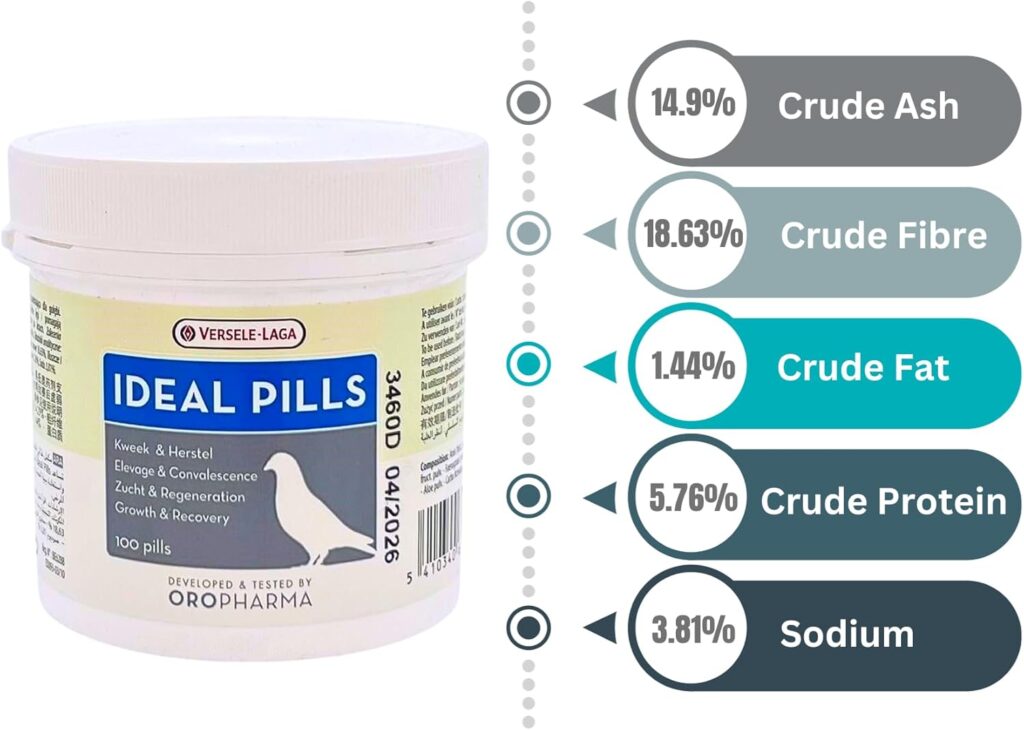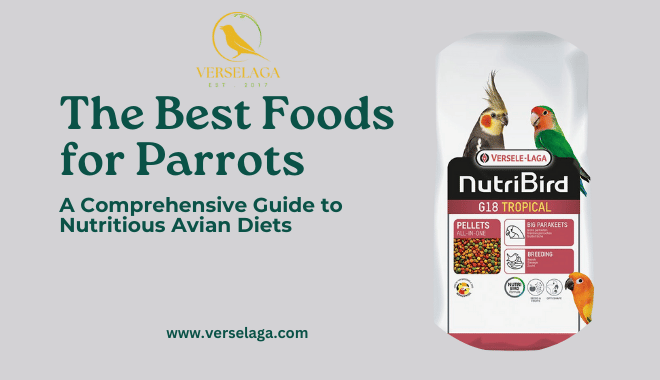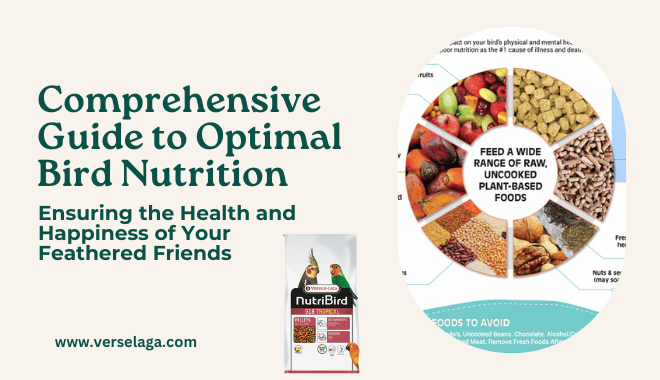Comprehensive Guide to Bird Vitamin Supplements: Ensuring Optimal Avian Health
Introduction to Bird Vitamin Supplements Birds, like all creatures, require a variety of nutrients to live healthy lives. While a balanced diet…
Introduction to Bird Vitamin Supplements
Birds, like all creatures, require a variety of nutrients to live healthy lives. While a balanced diet usually provides these essentials, certain situations—such as recovery from illness, breeding, or dietary limitations—might necessitate the use of supplements. Vitamin supplements can help bridge nutritional gaps and prevent deficiencies that could lead to health problems.

Essential Vitamins for Birds: What You Need to Know
The Building Blocks of Health
Birds, like all animals, require a diverse array of nutrients to lead healthy lives. Vitamins are organic compounds that are crucial in small quantities for smooth metabolic functioning, growth, and vitality. Unlike some animals, birds cannot synthesize most vitamins and must obtain them from their diet. Understanding which vitamins are essential and their role in avian health can help bird owners prevent nutritional deficiencies that often lead to severe health issues.
Key Vitamins Essential for Avian Health
Here we delve into each vitamin necessary for birds, exploring their roles, sources, and symptoms of deficiency:
- Vitamin A: Crucial for maintaining good vision, immune function, and skin and feather health, Vitamin A is vital for birds. It helps in the formation of visual purple in the eyes, which is essential for night vision, and maintains the health of epithelial tissues and mucous membranes, thereby preventing infections. Sources include carrots, spinach, and sweet potatoes. Deficiency signs include poor feather coloring, swollen eyes, and respiratory problems.
- Vitamin D3: Birds synthesize Vitamin D3 through their skin under exposure to sunlight, much like humans. It aids in the absorption and regulation of calcium and phosphorus, ensuring healthy bone formation and nerve function. Birds with insufficient UV light exposure often require dietary supplementation. Lack of Vitamin D3 can lead to metabolic bone disease and other skeletal problems.
- Vitamin E: This powerful antioxidant helps protect cells from oxidative damage and is essential for immune system function and general health. Dietary sources include nuts, whole grains, and dark leafy greens. Deficiency can lead to muscle weakness, reproductive issues, and immune dysfunction.
- Vitamin K: Necessary for proper blood clotting, Vitamin K is found in dark green leafy vegetables, like kale and turnip greens. A deficiency in Vitamin K can lead to hemorrhaging and other blood clotting disorders.
- B-Complex Vitamins:
- Thiamine (B1): Helps in carbohydrate metabolism and is vital for glucose regulation and appetite stimulation. Sources include whole grains and seeds. Symptoms of deficiency include weight loss and neurological disorders.
- Riboflavin (B2): Plays a crucial role in energy production and the metabolism of fats and proteins. Found in eggs, green vegetables, and whole grains, its deficiency can cause mouth and beak lesions.
- Niacin (B3): Essential for the health of the skin and gastrointestinal tract and also supports nerve function. Peanuts, sunflower seeds, and poultry are good sources. Lack of niacin can lead to dermatitis and diarrhea.
- Pyridoxine (B6): Vital for protein metabolism and the formation of red blood cells, it is found in corn, carrots, and peas. Deficiency symptoms include anemia and convulsions.
Integrating Essential Vitamins into Your Bird’s Diet
Ensuring your bird receives all these vitamins can seem daunting, but a balanced diet is key. Offering a variety of foods, considering fortified pellets, and consulting with a veterinarian about supplements can ensure your bird does not suffer from nutritional deficiencies. Here are some practical tips:
- Diversify the Diet: Incorporate a mix of fruits, vegetables, grains, and appropriate proteins to provide a spectrum of vitamins.
- Consider Supplements: Especially for birds on limited diets or those with specific health needs, supplements might be necessary. Always consult with an avian vet before adding supplements to avoid overdosing.
- Regular Health Checks: Monitoring your bird’s health can help catch signs of deficiency early, allowing for quick dietary adjustments.
A Proactive Approach to Avian Nutrition
Understanding and providing the essential vitamins for your birds is not just about preventing diseases; it’s about enhancing their life quality and longevity. By educating yourself on the roles of these vitamins and adjusting your bird’s diet accordingly, you can ensure a happier, healthier life for your feathered companions.
For more detailed guides on bird care and nutrition, visit our dedicated section at verselaga.com, where we provide expert advice and high-quality products designed to meet the unique needs of your birds. Remember, each bird is unique, and their nutritional needs can vary widely based on species, age, health status, and lifestyle. Regular consultations with an avian veterinarian will ensure that your approach to bird care is both informed and effective.
When to Consider Supplements for Your Birds: A Detailed Guide
Understanding the Role of Supplements in Avian Nutrition
Supplements can be a valuable addition to your bird’s diet, helping to prevent nutritional deficiencies and support overall health. However, they should be used judiciously to complement a well-rounded diet, not replace it. Supplements are particularly important in several specific scenarios:
- Dietary Deficiencies:
Birds fed a diet limited in variety — often seed-based diets — may lack certain essential nutrients. Supplements can help fill these nutritional gaps, providing vitamins, minerals, and other nutrients that a bird’s regular diet might miss.
- Health Recovery:
Birds recovering from illness or surgery often have increased nutritional requirements. Supplements can provide the necessary nutrients to help strengthen their immune system and speed up the recovery process.
- Life Stages:
Different life stages require different nutritional approaches. For example, growing chicks, breeding birds, and aging avians might need additional vitamins, minerals, or specific nutrients that a standard diet might not sufficiently provide.
- Environmental Factors:
Birds living in environments with limited natural sunlight may require vitamin D supplementation, as sunlight is necessary for the synthesis of this vitamin, which is crucial for calcium absorption and bone health.
- Special Health Needs:
Birds with specific health issues, such as liver or kidney disease, may benefit from certain supplements that support organ function and overall health.
Key Considerations Before Supplementing
Before integrating supplements into your bird’s diet, it is essential to consider the following:
- Veterinary Consultation:
Always consult with an avian veterinarian before starting any new supplement. They can provide guidance based on your bird’s specific health needs and dietary background.
- Quality and Formulation:
Choose high-quality, avian-specific supplements to ensure safety and efficacy. Avoid products with artificial additives or fillers that could be harmful to your bird.
- Correct Dosage:
Adhering to the recommended dosage is critical. Over-supplementation can lead to toxicity and other health issues, just as harmful as a deficiency.
How to Safely Integrate Supplements into Your Bird’s Diet
Integrating supplements into your bird’s diet should be done with care to ensure optimal benefits:
- Gradual Introduction:
Start with a smaller dose than recommended and gradually increase to the full dosage as directed by your veterinarian. This approach allows you to monitor your bird’s reaction to the supplement.
- Consistency:
Regularity is key in supplementation. Administer supplements consistently as part of the daily feeding routine to maintain steady nutrient levels.
- Monitor and Adjust:
Keep a close eye on your bird’s health and behavior. If you notice any adverse reactions or lack of improvement, consult your veterinarian. Adjustments may be necessary depending on how your bird responds to the supplements.
Choosing the Right Supplements for Your Bird
At verselaga.com, we understand the critical role that dietary supplements can play in the health and well-being of your feathered companions. As an experienced SEO-focused content writer specializing in avian care, I am committed to providing our readers with in-depth, actionable insights that blend practical advice with thorough research. This guide is designed to help you navigate the complex world of bird supplements, ensuring that you make informed decisions that benefit your bird’s health.
Understanding the Basics: Why Supplements Matter
Birds, like all pets, have specific nutritional requirements that must be met for them to thrive. While a balanced diet is the cornerstone of good health, certain situations such as dietary restrictions, health conditions, or life stages might necessitate the use of supplements. Supplements can provide targeted nutrients to help manage deficiencies, support overall health, and even prevent future issues.
Assessing Your Bird’s Needs
Before introducing any supplements into your bird’s diet, it’s crucial to assess their specific needs:
- Health Assessment:
Regular check-ups with an avian veterinarian can help determine if your bird lacks any nutrients or if it has any health conditions that supplements could help alleviate.
- Diet Evaluation:
Analyze your bird’s current diet to identify any potential nutritional gaps. This can involve looking at the types of food your bird consumes and their nutritional content.
- Age and Life Stage Considerations:
Different life stages require different nutritional support. For instance, breeding birds, growing chicks, and aging birds might have additional requirements that can be supplemented effectively.
Selecting the Right Supplements
Choosing the right supplement is critical to ensure that it effectively addresses your bird’s needs without causing any adverse effects. Here are some key considerations:
- Ingredient Quality:
Opt for supplements that contain high-quality, natural ingredients. Avoid products with artificial colors, flavors, or unnecessary fillers that could harm your bird.
- Formulation for Birds:
Ensure that the supplement is specifically formulated for avian use. Birds have unique digestive systems and metabolism rates, so products designed for other animals might not be suitable.
- Reputable Brands:
Choose supplements from reputable manufacturers known for their quality and safety standards. Research brand reviews and consult with your vet to find the best options.
- Vet Recommended:
Always discuss any new supplements with your avian vet before introducing them to your bird’s diet. They can provide guidance on the appropriate type, dosage, and duration of supplementation.
Integrating Supplements into Your Bird’s Diet
Once you have selected the right supplement, integrating it into your bird’s diet should be done carefully:
- Gradual Introduction:
Start with a smaller dose than recommended and gradually increase it to the full dose over several days. This allows you to monitor your bird’s response to the supplement.
- Consistency:
Administer supplements consistently as part of your bird’s daily routine. This helps maintain stable nutrient levels in your bird’s body.
- Monitor Changes:
Keep an eye on your bird’s health and behavior as you introduce the supplement. Note any positive changes or potential side effects and adjust the supplementation accordingly.
Empowering Your Choices
Choosing the right supplements for your bird involves careful consideration and informed decision-making. By understanding your bird’s unique needs and selecting high-quality products, you can significantly enhance their diet and overall health. At verselaga.com, our goal is to provide you with the resources you need to make the best choices for your avian companions, ensuring they live long, healthy lives.
For further guidance and specific product recommendations, explore our detailed articles and resources on verselaga.com. Here, you’ll find expert advice and high-quality products designed to meet the diverse nutritional needs of birds. Remember, informed care is the best care, and we are here to help you provide it.
Integrating Supplements into Your Bird’s Diet: A Comprehensive Guide
As an experienced SEO-focused content writer for verselaga.com, I specialize in crafting engaging, long-form articles that provide practical insights into the world of avian care. This detailed guide is designed to help bird owners understand the nuances of integrating supplements into their bird’s diet effectively and safely, ensuring they support their feathered friends’ health without complications.
Understanding the Importance of Supplements in Avian Nutrition
Supplements can play a crucial role in a bird’s diet, especially when specific nutrients are lacking or when birds have increased nutritional needs due to health conditions, life stages, or recovery processes. However, the introduction and integration of supplements must be handled with care to avoid over-supplementation and ensure that the benefits are maximized without adverse effects.
Assessing Your Bird’s Needs
Before introducing any supplements, it is imperative to assess your bird’s current health status, diet, and specific needs:
- Consult with an Avian Veterinarian:
Engaging with a professional will provide a tailored approach based on your bird’s health. This step is crucial for determining which supplements are necessary and safe for your bird.
- Analyze the Current Diet:
Evaluate what your bird is currently consuming to identify potential nutritional gaps. This analysis helps in selecting supplements that effectively address these deficiencies.
- Consider Life Stage and Health Condition:
Different life stages and health conditions might necessitate various supplements. For instance, aging birds or those in the breeding phase could require additional nutrients that their current diet does not sufficiently provide.
Choosing the Right Supplements
Selecting appropriate supplements is critical and involves several considerations to ensure compatibility and safety:
- Quality and Specificity:
Opt for high-quality, avian-specific supplements to avoid ingredients that could be harmful to birds. Ensure the supplements are sourced from reputable manufacturers.
- Correct Formulation:
Choose supplements that are formulated for the particular species of bird you own, as different birds have varying nutritional requirements.
- Avoiding Harmful Additives:
Read labels carefully to ensure the supplements are free from artificial colors, flavors, or any other additives that could be detrimental to your bird’s health.
Steps for Integrating Supplements into Your Bird’s Diet
The process of integrating supplements should be gradual and closely monitored:
- Introduction Phase:
Begin by introducing a smaller dose than recommended to see how your bird reacts to the supplement. Gradually increase to the prescribed dosage over several days or weeks, depending on the bird’s response.
- Mixing with Food:
To ensure that your bird consumes the entire supplement, mix it with their favorite food. This method helps mask the supplement and makes it more appealing.
- Consistency is Key:
Regular administration is crucial to maintain optimal nutrient levels. Incorporate the supplement into the daily feeding routine to establish a consistent schedule.
- Monitoring and Adjustment:
Observe your bird closely for any changes in behavior or health. Adjust the supplement dosage or frequency as recommended by your veterinarian based on these observations.
Documenting the Journey
Keeping a detailed record of your bird’s supplement intake, reactions, and any health changes can be incredibly valuable, especially during regular veterinary check-ups. This documentation helps in tracking progress and adjusting the supplementation plan as needed.
A Balanced Approach to Supplement Integration
Integrating supplements into your bird’s diet can significantly enhance their overall health when done correctly. By following the steps outlined in this guide, bird owners can ensure that their avian companions receive the nutritional support they need. For more detailed information on specific supplements and their benefits, visit our in-depth resources at verselaga.com. Remember, a well-informed approach to supplementation is key to supporting your bird’s health and wellbeing.
Conclusion : A Balanced Approach to Bird Nutrition
In conclusion, while a diverse and balanced diet is fundamental to a bird’s health, vitamin supplements can play a crucial role in ensuring all nutritional needs are met, especially in specific health scenarios. By understanding when and how to use these supplements effectively, you can significantly enhance your bird’s health and vitality.
For more insights and detailed guides on bird care, continue exploring verselaga.com. Here, you’ll find a wealth of resources designed to help you provide the best possible care for your feathered companion, ensuring they enjoy a long, healthy, and happy life. Remember, each bird is unique, and their nutritional needs can vary widely based on species, age, health status, and lifestyle. Regular consultations with an avian veterinarian will ensure that your approach to bird care is both informed and effective.


